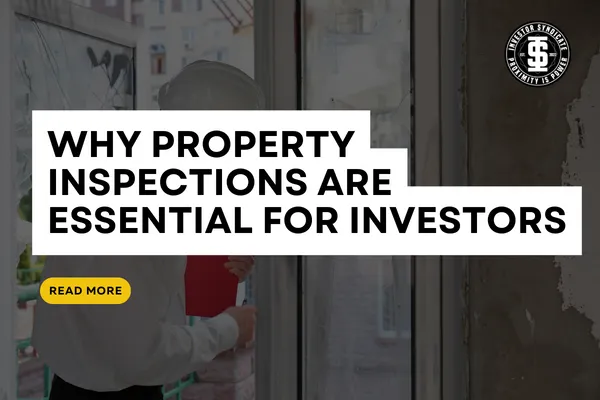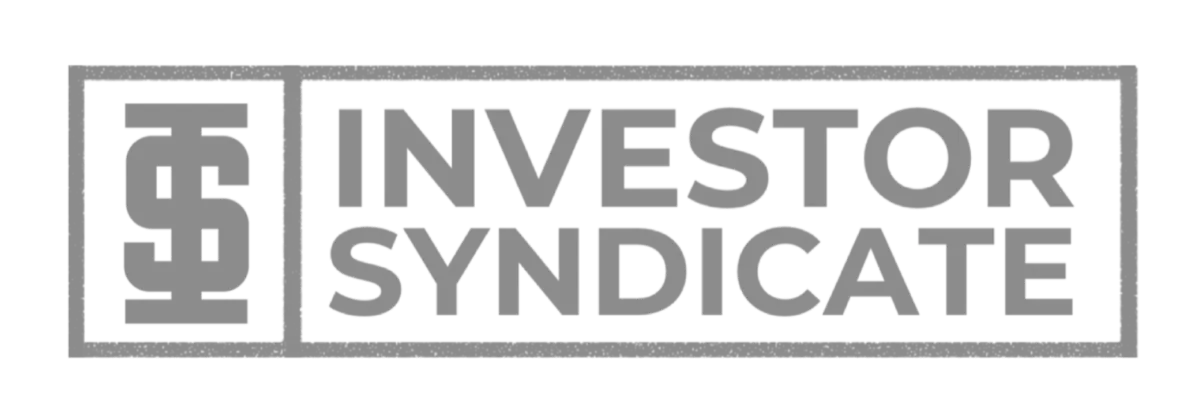Investor Syndicate Blogs
Download The Deal Flipping Playbook

Why Property Inspections Are Essential for Investors
Introduction
Buying a property can be a thrilling adventure, especially when you're searching for the perfect place to call home or a smart investment opportunity.
But before you dive headfirst into the world of real estate, there's an important step you should never skip: property inspections.
What Are Property Inspections?
Property inspections are like check-ups for houses and buildings.
Just like you visit the doctor to make sure you're healthy, property inspections make sure the property you're interested in is in good shape.
They involve hiring a professional inspector to examine the property from top to bottom.
These experts have a keen eye for spotting any issues, big or small, that might be hiding beneath the surface.
Why Do Investors Need Property Inspections?
1. Hidden Problems
Investors, people who buy properties to make money, need property inspections because they uncover hidden problems.
Imagine buying a house that looks great on the outside but has a leaky roof, faulty wiring, or plumbing issues you can't see.
These hidden problems can turn your investment into a costly nightmare.
Property inspections help you discover these issues before you buy, so you can make an informed decision.
2. Negotiating Power
When an inspector finds issues during an inspection, it gives you negotiating power.
You can ask the seller to lower the price or fix the problems before you proceed with the purchase.
This can save you a lot of money and stress in the long run.
3. Planning for Repairs
If you're an investor planning to fix up a property and sell it for a profit (known as "flipping"), property inspections are crucial.
They help you understand the scope of repairs needed and create a realistic budget and timeline for your project.
This prevents unexpected surprises down the road.
4. Legal Protection
In some cases, property inspections can offer legal protection.
If the inspector misses a major issue that causes problems after your purchase, you may have legal recourse against the inspector or seller.
It's like having insurance for your investment.
What Do Property Inspectors Look For?
Property inspectors are like detectives, searching for clues to the property's condition. Here are some of the key areas they investigate:
Structural Integrity
Structural integrity is like the backbone of a building. It's all about making sure that the house or any structure stands strong and safe.
Imagine if a house were a giant puzzle, and each piece had to fit perfectly to keep it from falling apart.
That's what structural integrity is about—checking that all the pieces of a building, like the walls, roof, and foundation, are in good shape and can hold everything up.
If there are cracks, sagging, or problems with any of these pieces, it can be a big concern.
Inspectors look closely to make sure everything is sturdy and safe because nobody wants a wobbly house!
Electrical Systems
Electrical systems are a crucial part of any building, whether it's a home, school, or office.
These systems are like the nerves of the building, carrying electricity to power lights, appliances, and gadgets.
Imagine if your home didn't have electricity; you wouldn't be able to charge your phone, watch TV, or even turn on the lights!
Inspecting electrical systems is essential to make sure everything is safe and working correctly. Inspectors check the wiring to ensure there are no frayed or damaged parts.
They also look at outlets and switches to make sure they work properly.
This inspection helps prevent electrical fires and keeps you and your property safe.
So, next time you turn on a light or charge your devices, remember that electrical systems play a vital role in making it all happen safely and efficiently.
Plumbing
Plumbing is an essential part of any building, whether it's a house, an apartment, or a school.
It's like the system of pipes and faucets that bring water to your kitchen sink, bathroom shower, and even your toilet.
Plumbing also takes away the dirty water and waste, so your home stays clean and hygienic.
Plumbers are like the doctors of the plumbing world.
They fix any problems with the pipes, like leaks or clogs.
Think of them as the heroes who ensure you have clean water to drink, take showers, and flush the toilet.
Plumbing might not sound exciting, but it's crucial for our daily lives.
Without it, we wouldn't have running water or a way to get rid of wastewater.
So, next time you turn on the tap or use the restroom, remember that plumbing is working behind the scenes to make it all happen smoothly.
HVAC (Heating, Ventilation, and Air Conditioning)
Heating, Ventilation, and Air Conditioning, often abbreviated as HVAC, is like the breathing system of a house.
Just as we need fresh air to stay healthy and comfortable, houses need HVAC systems to maintain the right temperature and air quality.
Let's break it down:
Heating: This part keeps your house warm during chilly days, just like a cozy blanket. It can be a furnace, a boiler, or even a heat pump that circulates warm air.
Ventilation: Think of this as your home's way of taking a deep breath. It ensures fresh air circulates throughout your house, helping to eliminate stuffy or stale air.
Air Conditioning: When it gets too hot, the air conditioning comes to the rescue. It cools down your home, making it a comfortable place to be on scorching days.
So, HVAC systems are like the comfort controllers of your house, making sure you're always in the perfect environment.
Roof and Attic
The roof and attic might not be the first things you think about when it comes to a house, but they play a crucial role in keeping your home safe and cozy.
Let's take a closer look at why they're so important.
The Roof: Think of the roof as your home's hat. It shields you from rain, snow, and sunlight.
A strong, well-maintained roof keeps your house dry and free from leaks. If there are problems with the roof, it can lead to water getting inside, which can damage your walls, ceilings, and even your belongings.
So, it's essential to have a roof in good condition.
The Attic: Now, think of the attic as your home's secret hideout. It's the space right under the roof.
Attics are useful for storing things, but they also help control the temperature in your home.
They act like a big blanket, keeping your house warm in winter and cool in summer.
But if there are issues in the attic, like poor insulation or pests, it can affect your comfort and energy bills.
Pest Infestations
Pests are unwanted guests in your home or property, and dealing with pest infestations is essential to keep your space safe and comfortable.
These unwanted visitors can come in various forms, from tiny insects like ants and termites to larger creatures like rats and mice.
When pests invade, they can cause all sorts of problems, including damage to your property, health risks, and annoyance.
Why Pest Infestations Are a Concern
1. Property Damage
Pests can chew through wires, gnaw on wood, and damage the structure of your home or building. Termites, for example, are notorious for eating away at the wooden parts of houses, leading to costly repairs.
2. Health Risks
Some pests can carry diseases or trigger allergies. For instance, mosquitoes can transmit diseases like West Nile virus, and cockroaches can worsen allergies and asthma.
3. Unwanted Visitors
No one likes to share their living space with pests. They can be a constant source of irritation and stress.
4. Food Contamination
Pests in your kitchen can contaminate your food, making it unsafe to eat. This can lead to food poisoning and other health issues.
How to Deal with Pest Infestations
The good news is that you don't have to tolerate pest infestations. Here are some steps to help you address the issue:
1. Prevention
Preventing pest infestations is the best approach. Keep your property clean, store food properly, and seal any entry points pests might use.
2. Identify the Pest
Identify the type of pest you're dealing with. This will help you choose the right method for removal.
3. DIY Methods
For minor infestations, you can try do-it-yourself methods like traps, baits, or natural remedies.
4. Professional Help
If the infestation is severe or if you're dealing with dangerous pests like venomous spiders or aggressive rodents, it's best to call a professional pest control service.
Environmental Hazards
Environmental hazards are things in our surroundings that can be harmful to our health or the environment itself.
These hazards can come in many forms, and it's essential to be aware of them to stay safe.
One common environmental hazard is pollution.
This can include air pollution, where harmful gases and particles are released into the air, making it difficult to breathe and causing health problems.
Water pollution is another concern, where chemicals and contaminants get into our water sources, making them unsafe to drink or swim in.
Soil pollution can harm plants and animals, disrupting ecosystems.
Other environmental hazards include natural disasters like hurricanes, earthquakes, and floods.
These events can cause significant damage to homes and communities and pose risks to human life.
To protect ourselves and the environment, we must be mindful of these hazards and take steps to reduce our impact on the planet.
This includes conserving resources, reducing pollution, and being prepared for natural disasters.
By understanding and addressing environmental hazards, we can create a safer and healthier world for ourselves and future generations.
Safety Features
Safety features are like the guardians of a property, making sure everyone inside stays safe and sound.
These important elements are like your own personal superheroes, always ready to protect you from harm.
Let's take a closer look at what safety features are and why they matter.
Safety features in a property include things like smoke detectors, carbon monoxide detectors, fire extinguishers, and even security systems.
These devices are designed to alert you if there's a danger, like a fire or a gas leak, so you can take action quickly.
Smoke detectors are like little detectives that can sense smoke in the air.
When they do, they make a loud beeping noise to let you know there might be a fire.
Carbon monoxide detectors are like sniffing machines that can detect a colorless and odorless gas that can be very harmful. They beep when they sense carbon monoxide, giving you a heads-up to get out of the area.
Fire extinguishers are like mini firefighters that you can use to put out small fires before they become big problems.
They spray a special foam or chemicals that can smother the flames.
Security systems are like guards that watch over your property.
They can include cameras, alarms, and sensors that can alert you or the authorities if there's a break-in or suspicious activity.
Having these safety features in place is like having a team of protectors on your side, ready to keep you safe and sound.
They give you peace of mind, knowing that if something goes wrong, you'll be alerted and can take action.
So, whether you're at home or in a property you're visiting, always make sure safety features are in working order because they're there to look out for you.
Property inspections are an investor's best friend.
They provide peace of mind, protect your investment, and help you make informed decisions.
So, whether you're planning to buy your dream home or looking for profitable real estate investments, never underestimate the power of a thorough property inspection.
It's a small investment that can save you from big headaches down the road. Happy property hunting!
Contact Us

Bet On Yourself
Empowering real estate investors with the tools they need to scale.






